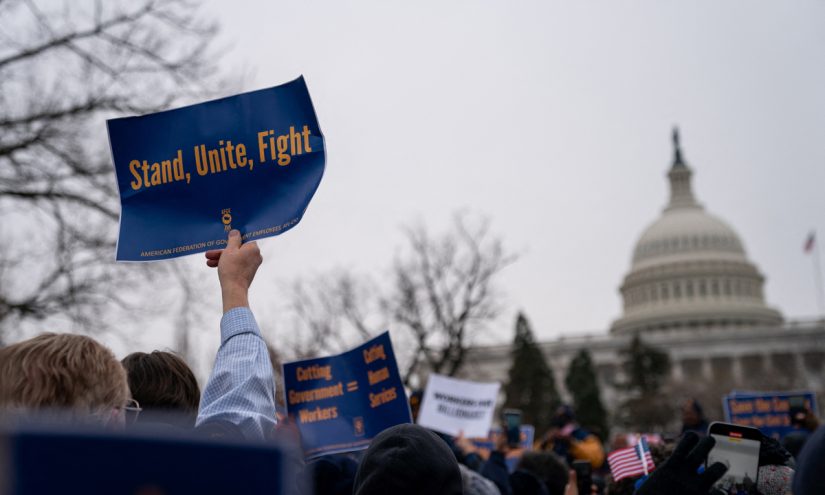Get stories like this delivered straight to your inbox. Sign up for The 74 Newsletter
As debates about education issues and policy intensify across the nation, teachers unions are participating in rallies, lawsuits and legislative sessions to make their voices heard. Bills proposed in multiple states focus on unions, their work and funding, and unions are organizing to protest developments in education on the federal level. Here’s a roundup of recent activities across the country as 2025 unfolds:
Washington, D.C.
On Thursday, a federal district court judge in Maryland granted a temporary restraining order barring the Department of Education and the Office of Personnel Management from disclosing personally identifiable information to Elon Musk’s Department of Government Efficiency.
The American Federation of Teachers, the nation’s second-largest teachers union, filed a federal lawsuit with a coalition of labor unions Feb. 12 alleging that the department illegally gave DOGE access to millions of private and sensitive records.
The court ruled that the AFT would likely succeed in its lawsuit and agreed that the two agencies “likely violated the Privacy Act by disclosing their personal information to DOGE affiliates without their consent.” The restraining order will expire March 10.
“This is a significant decision that puts a firewall between actors whom we believe lack the legitimacy and authority to access Americans’ personal data and are using it inappropriately, without any safeguards,” union President Randi Weingarten said in a press release.
In other action, the union announced on Feb. 19 that March 4 will be a “Day of Action” as part of a recently launched campaign called Protect Our Kids.
The National Education Association, the nation’s largest teachers union, organized a rally outside the U.S. Capitol on Feb. 12 to protest the nomination of Linda McMahon as secretary of education.
In response to administration efforts to downsize federal agencies, the American Federation of Government Employees filed a lawsuit to stop a resignation program that prompted thousands of workers to leave their jobs. The nation’s largest federal employee union — which represents U.S. Department of Education staff — argued that the program was unlawful, according to The New York Times.
California
Members of unions in 32 California school districts have banded together to negotiate a shared set of contract demands: improved wages and benefits, smaller class sizes, fully staffed schools and more resources for students.
The locals united as part of the California Teachers Association’s “We Can’t Wait” campaign, which launched Feb. 4. The districts employ a total of 77,000 educators and teach 1 million students, and include some of the largest in the state: Los Angeles, San Diego, San Francisco, Oakland and Sacramento.
Many of the unions’ contracts are set to expire this summer. California Teachers Association President David Goldberg said in a Feb. 4 webinar that the campaign is intended to build pressure statewide, according to EdSource.
At one charter school in the San Fernando Valley, teachers staged a four-day strike after working without a contract since July 1. Educators at El Camino Real Charter High School, who are represented by United Teachers Los Angeles, walked out from Feb. 10 to 14 before reaching an agreement that includes a 19% salary increase over three years, the Los Angeles Daily News reported.
The nation’s first charter school strike occurred in 2018, a four-day work stoppage at Acero, one of Chicago’s largest charter school networks. The vast majority of charter schools are not unionized.
Idaho
A bill that would ban taxpayer funds from going toward teachers union operations advanced out of committee to the full House on Feb. 12. The bill’s sponsor, state Rep. Judy Boyle, said the measure is intended to cut down on what she called “under-the-table” dealings between school districts and unions, according to the Bonner County Daily Bee.
HB98 would apply only to teachers unions, not to other public-sector unions that represent occupations like first responders, according to the Idaho Education Association. It would require teachers to use personal leave to do union work, eliminate payroll deductions for dues and ban distribution of union materials on school property. Violators could be fined up to $2,500.
“This wasn’t the outcome we wanted, but we’re not done fighting this bad bill yet,” Chris Parri, the union’s political director, said in a statement. “We’ll need all hands on deck to kill it for good in the [state] Senate when the time comes.”
Illinois
The Chicago Teachers Union rejected a recommendation Feb. 4 from a neutral arbitrator that negotiators return to the bargaining table and reach agreement with Chicago Public Schools on a new contract that includes higher pay for veteran teachers and more librarians. In a letter to the district, the union wrote that the mediator “rightly notes that [Chicago Public Schools] consistently signs … labor contracts despite claiming it lacks the funds to afford them.”
Once the recommendation is rejected, the union has to wait 30 days before it can give the district a 10-day strike notice. The Chicago Teachers Union went on strike during contract negotiations for seven days in 2012, one day in 2016 and 11 days in 2019.
Massachusetts
Lawmakers questioned the state’s largest teachers union at a special hearing Feb. 10 over learning materials that some members believe were antisemitic.
The Massachusetts Teachers Association, which represents more than 117,000 educators, was criticized by legislators for materials made available to teachers about the Israel-Hamas conflict. President Max Page said in a statement that the documents were created by request from the union’s board and published in a members-only area of the union website.
Examples included a poster on the Israel-Hamas war reading, “what was taken by force can only be returned by force” and a book about a Palestinian girl who says, “a group of bullies called Zionists wanted our land so they stole it by force and hurt many people,” according to Boston.com.
“The notion that our union is trying to ‘indoctrinate’ our young people is simply not true, and accusations to that effect have led to death threats to me and my staff, and to other attacks on our union,” Page said. “Posting resources does not imply agreement with each and every document. Nor would we ever expect that our members would look at these resources with an uncritical eye.”
An online petition by the Israeli-American Civic Action Network that asks lawmakers and state agencies to halt collaboration with the union on legislation has received more than 17,000 signatures.
Utah
One of the first bills Gov. Spencer Cox signed into law this year bars teachers unions from bargaining collectively and conducting operations on school property.
The governor signed HB267 on Feb. 14, marking the end of a weeks-long debate about how public-sector unions should operate. Lawmakers who favored the bill said it will ensure transparency in unions and protect taxpayer resources, but educators said it will only make a job that’s already full of challenges more difficult.
While it doesn’t prevent employees from joining a union, the law prohibits public agencies — which employ teachers, firefighters, police officers and county workers, among others — from “recognizing a labor organization as a bargaining agent” and “entering into collective bargaining contracts.”
The Utah Education Association said HB267 will also weaken advocacy because it cuts off access to schools by barring unions from using public property for free. Some opponents of the bill charged it was created to retaliate against the Utah Education Association, which is challenging the constitutionality of Utah’s school voucher program in court. The association is the state’s largest teachers union, with 18,000 members.
Get stories like these delivered straight to your inbox. Sign up for The 74 Newsletter








